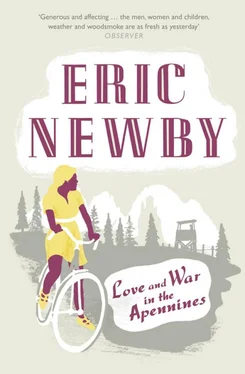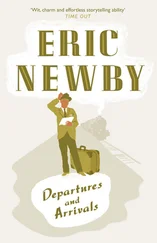1 ...7 8 9 11 12 13 ...17 If I had not had marginally O.K. friends who had not abandoned me when we moved to the orfanotrofio from the camp in which we had previously been imprisoned I, too, would have become a dweller in darkness, which I did not want to be. I wanted the opportunity to observe the O.K. people at close quarters and some inner voice told me, quite correctly for once, that this was going to be my last chance ever to do so in the whole of my life.
Before the war I had rarely spoken to O.K. people, let alone known any well enough to talk to. Even at Sandhurst in 1940, where I was a member of the Infantry Wing in the Old Buildings, which were so much more elegant than the New Buildings, O.K. people had been rarities. They were accommodated in the hideous New Buildings, which were not really new at all but were newer than the old ones; or else they were members of something called The Royal Armoured Wing – I now forget where they lived – which had to do with armoured fighting vehicles and therefore with what was still called the Cavalry, which was nothing to do with the Royal Tank Regiment and still isn’t, thirty years later.
When I was very young I sometimes used to see what I immediately recognised as midget versions of O.K. people in Children’s Hairdressing on the first floor at Harrods, to which my mother, who had been a model girl at the store and had a nostalgia for the place, used to take me from Barnes to get my hair cut, where they exercised themselves on the rocking horses while waiting to be given the treatment and never let me have a go. I used to see them, too, wearing hand-made overcoats with velvet collars and long gaiters with hundreds of buttons down the sides, the sort of outfit which would have caused any un-O.K. child to have a fit of apoplexy in the mild spring weather in which they were dressed like this, being pushed up Sloane Street in huge, glossy machines known as Victoria carriages, which were short-wheelbase prams with curled up fronts, like seashells, in which they travelled sitting more or less upright with their backs to whoever was pushing them and, usually, with a dark blue blanket clipped over the front with their initials, or their parents’ initials, embroidered on them, on their way to the Dell, a charming grassy depression on the far side of Rotten Row, in the Park. They were still being conveyed about in these carriages at an age when I had long forgotten what it was like to be in a push-chair, which was what I had had to make do with after my nanny had been shown the door.
The nurses who had the pushing of these little O.K. boys who sat, as it were, with their backs to the engines, were invariably bad-tempered looking and absolutely hideous. They wore porkpie hats with badges on them, long, drab overcoats of putty-coloured gabardine or grey flannel, with lisle stockings to match, and clumpy great shoes; not like my very sexy suburban nanny who wore a uniform bought for her by my mother – who had not been a model girl for nothing – a blue denim dress in summertime with stiff white collar and cuffs and black silk stockings and high-heeled shoes, and whose head was swathed in some sort of dark blue veiling when she took me out for an airing, often to have assignations with what looked to me like very old men but were probably quite young ones, in a graveyard, not in fashionable S.W.1 but in S.W.13, keeping me quiet while she did whatever she did with them by giving me handfuls of Carrara marble chippings from the tombs to play with. (She was fired when my mother found me still playing with them in the bath.) If this nanny, of whom photographs still exist in an album, which enables me to remember more clearly than I would otherwise have been able to do what she looked like, had taken me to the Dell, the other nannies would have ignored her, not only because she was far too good looking to be a nanny, but because I was not an O.K. child.
Whatever else I may have envied them I certainly did not envy these little O.K. boys their nannies.
‘Why is the sky blue, Nanny?’ I heard one ask in the bell-like upperclass voice which I envied and always wished that I could emulate – mine sounded as if it emanated from my boots. To which he got the reply, ‘Ask no questions and you’ll be told no lies, little Mr Inquisitive.’
And later when we were all a bit older, and I was on my way to or from the dentist, also in S.W.I, with my mother’s ‘Help’, I sometimes used to see a shambling crocodile of them, all wearing the strange-looking, tomato-coloured caps of a smart pre-prep school, which looked like the sort of caps that some Irish peasants still wear, being shepherded along the road by a number of brisk grown-ups, all wearing no-nonsense-from-you expressions.
‘Well-born they may be, Master Eric,’ the ‘Help’ said stoutly, when they had shuffled past, ‘but most of them look half-barmy to me.’ And when the war came and I was on embarkation leave I saw them again in Harrods, in various splendid uniforms with their mothers and sisters and girl friends who all wore miniature replicas of their regimental badges picked out in diamonds, and again listened with awe to their loud, self-confident voices, usually we were ascending or descending together in one of the lifts, slightly cracked versions of the bell-like tones I had listened to with envy on the way to the Dell sixteen years before. But this was the first opportunity I had had to consort with them and study them at leisure and en masse.
In the camp the members of the coteries moved easily in a mysterious, almost Edwardian world and when they addressed one another they used nicknames, just as the Edwardians had been so fond of doing, which were completely unintelligible to anyone else, and they knew who was who so far down the scale of the aristocracy to a point at which one would have thought that any blue blood corpuscles would have been non-existent. They alone knew that ‘Bolo’ Bastonby was the nephew of the Earl of Crake, that ‘Jamie’ Stuart Ogilvie-Keir-Gordon was the youngest brother of the Master of Dunreeking and that ‘Feathers’ Farthingdale was the third son of the Marquis of Stale by his second wife. No one outside these coteries had even heard of the holders of the titles, let alone ‘Bolo’ Bastonby, ‘Jamie’ Stuart Ogilvie-Keir-Gordon or ‘Feathers’ Farthingdale.
One interesting thing I noticed about them, and this applied to almost all of them, was that they would not tolerate any criticism by outsiders of anyone whom they regarded as being ‘one of us’, even though the person being criticised might be hundreds of miles away.
Down at the marginally O.K. end of the otherwise O.K room which I inhabited, there was an officer in a very grand regiment who was not completely accepted by the coterie because none of them knew anything about his family and because he had been commissioned from the ranks of the same regiment in peacetime, a rare thing and one that implied that he probably possessed gifts which, in such a regiment, might take him to the heights of his profession and one that most marginally O.K. and un-O.K. people in the orfanotrofio who knew about it, regarded as ‘a good thing’ or ‘a good show’. And because he was in such a grand regiment he was allowed more latitude than the average marginally O.K. resident. But one evening he went too far.
‘I think Randolph Churchill’s a shit,’ he said, in the course of a long, rambling, semi-drunken conversation about the past which had temporarily united the two ends of the room. And from the other end of it, like an echo that had somehow gone wrong, came a passionate cri de coeur from someone who – I happened to know, because he had himself told me so on a previous occasion – had never met Randolph Churchill in his life, and everyone else at his end of the room, some of whom did know Randolph Churchill well, knew it too.
Читать дальше












